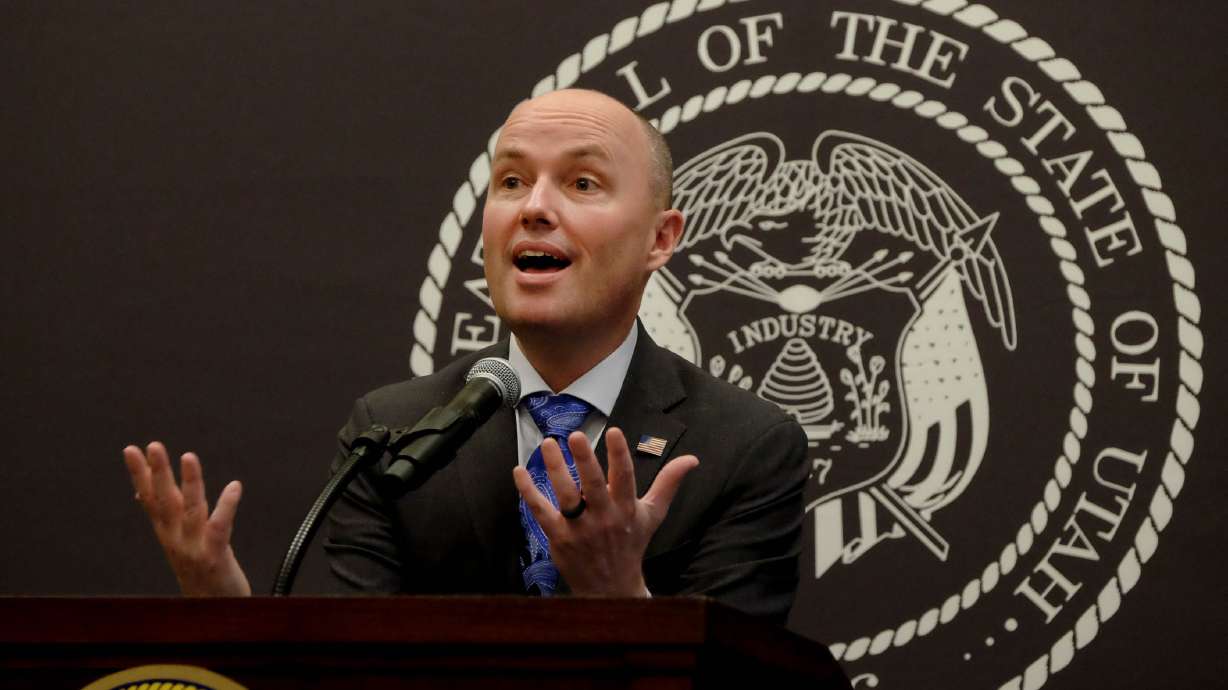Estimated read time: 4-5 minutes
This archived news story is available only for your personal, non-commercial use. Information in the story may be outdated or superseded by additional information. Reading or replaying the story in its archived form does not constitute a republication of the story.
SALT LAKE CITY — Gov. Spencer Cox was optimistic and enthusiastic on Utah's outlook for ending the pandemic at Thursday's weekly COVID-19 news conference. But the newly elected state leader did contend that while the future is bright, things could have gone better had the state implemented a mask mandate sooner.
"Sometimes we've gotten it right and sometimes we've gotten it wrong," he said. "We made other mistakes earlier by not doing masks, by not mandating those earlier, which could've helped and maybe save some lives."
Former Gov. Gary Herbert held out on implementing a statewide mask order for months into the pandemic and only relented after a huge case surge ahead of Thanksgiving in November. At the time, Cox had just won the gubernatorial election and was still in his role of lieutenant governor as well as the head of the state's coronavirus task force.
"In retrospect, we should have and probably could have mandated that," Cox said on Thursday.
While the state did not have an official mask mandate until the late fall, Herbert, Cox and other officials recommended the use of a face covering and produced 2 million masks for distribution to those who needed one.
"Many of us have been right on issues in this pandemic and many of us have been wrong at different times," Cox said on Thursday, emphasizing the balancing act officials are faced with as new information comes to light.
In March of 2020, face coverings weren't yet a political issue and health officials and agencies, including the Centers for Disease Control and Prevention, asked residents not to wear them.
CDC guidance at the time advised against the wearing of face coverings, saying medical supplies needed to be preserved for hospital staff on the front lines and the covering would do little to prevent spread. But by April 2020, once asymptomatic spread was better understood, the CDC had updated its guidelines to advise every resident in the U.S. to wear a face covering.
"We've learned a lot about masks," Cox said. "We learned more about how effective masks were."
Since the early pandemic response, several studies have shown data to support that wearing masks is an effective way to slow the spread of the novel coronavirus, which is spread through respiratory droplets.
Similarly, several models developed by experts and scientists predicted COVID-19 cases in the country would peak significantly in March before a decrease in cases would be seen. In Utah, case numbers and the positivity rate have started to decrease in recent weeks as vaccine numbers continue to rise.
"It doesn't mean that they're bad people, it doesn't mean that they're bad scientists, it doesn't mean that they don't know what they're doing; it just means that things changed," Cox said.
To date, a total of 660,444 vaccine doses have been administered to Utahns, nearly doubling the number of total COVID-19 cases seen since the start of the pandemic at 369,433. A total of 1,890 Utahns have died from COVID-19 and 14,597 have been hospitalized, according to the Utah Department of Health.
The two-dose Pfizer and Moderna COVID-19 vaccines are currently available to eligible Utahns in the state, with the availability of the single-dose Johnson and Johnson vaccine expected in the coming days.
In all, Cox was extremely optimistic about the state's future with the pandemic, saying by summertime he hopes to be maskless at a Fourth of July parade. He predicted that by the end of April or in early May, there will be enough vaccine doses available for every adult in Utah who wants one to receive one.
So long as there's low transmission following majority vaccination, Cox believes masks will no longer be needed sooner than expected. That prediction could change, and if it does, the governor said the state would adjust its response.
Despite past mistakes made by leaders, Cox emphasized the importance of showing light at the end of the tunnel. Officials don't always have the perfect response and hindsight is 2020, he added.
"Sometimes we don't get it exactly right, and (masks) was probably one where we could've done it a little bit earlier," Cox said.










